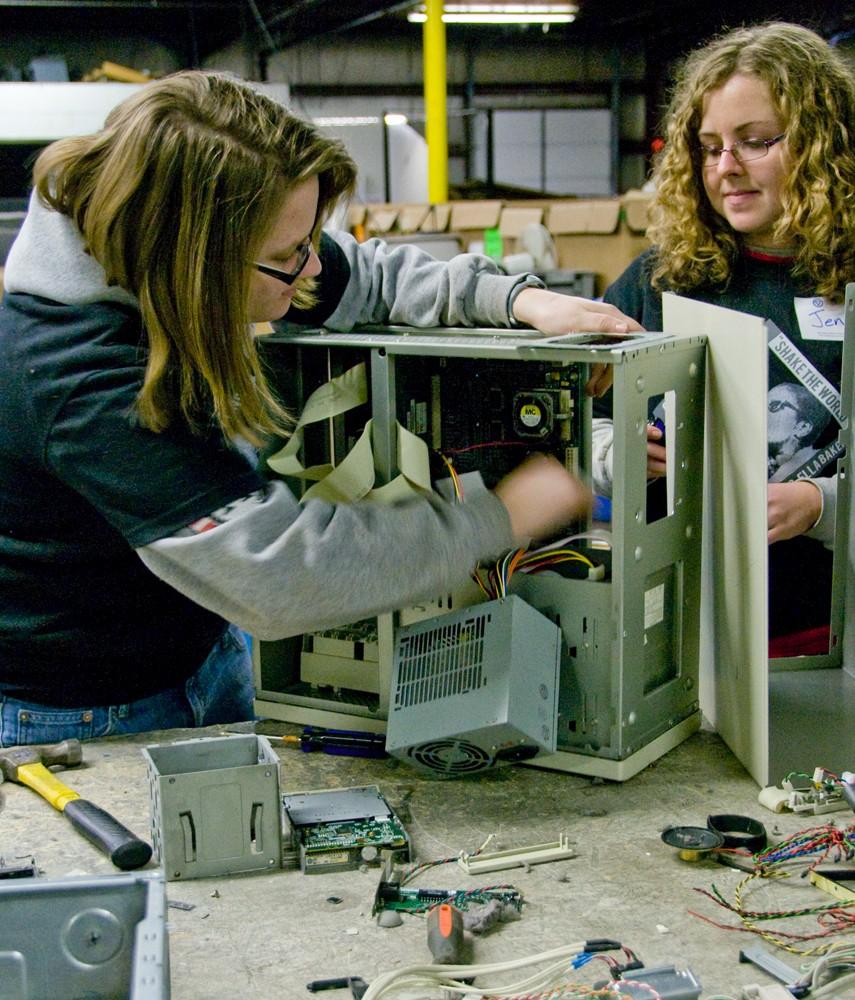Students save environment ‘one computer at a time’

Senior Amanda Alkema and graduate student Jen Koth take apart a computer while they volunteer at Comprenew
Jan 17, 2011
One cell phone battery can pollute 45,000 gallons of ground water. While technology is literally poisoning the environment, Grand Rapids nonprofit Comprenew will not allow electronics win the war.
To commemorate the vision of Dr. Martin Luther King Jr. and Ella Baker, Grand Valley State University students headed downtown to recycle computers on Saturday.
Comprenew typically sees crews of about 25 people, but the GVSU Day of Service brought almost 50 volunteers to the Comprenew warehouse.
They used screwdrivers and hammers to dismantle about 230 computers and separate their parts into individual bins – one for plastic, one for metal, one for case fans, one for motherboards, etc.
Joshua Lee said the Day of Service reflects the ideals of MLK and Baker because students learn what it means to advocate for the community.
“This is mirroring their mission in a more contemporary way,” Lee said. “This is part of the reason I love my job. I get to serve all the time.”
Lee said he enjoys working with Comprenew because of its many layers.
“Our mission statement here is to keep e-waste out of the landfills, to have community impact in terms of educating and being a resource to recycle in a responsible manner, and being that we’re a nonprofit and being that we’re an entity of worldwide Christian schools, all the profits that we make go to build and fund Christian schools in third world countries,” said Comprenew warehouse manager Robert Colt, who supervised the GVSU volunteers on Saturday.
Each computer the students disassembled will earn Comprenew about $8.
Most profit comes out of the motherboards with their connectors made of gold, large copper or cast aluminum heat sync, easily removable and resalable random access memory (RAM), and other bits made of copper.
“Anything that we do not refurbish and resell – it comes back (to the warehouse), and it is disassembled,” Colt said. “We have a buyer just for clean motherboards.”
People pay for the metals salvaged from the computer components.
While the motherboard is the big moneymaker, the hard drive also offers some salvageable materials, such as aluminum, platinum and rare earth magnets.
Comprenew also wipes and reformats the hard drives for sale.
“We have services where we will do a data wipe and send (the donor) a certificate that we wiped that particular data,” Colt said. “Because when hospitals and even colleges give us their old computer, it still has a lot of pertinent information on it. So, as an added service, we make sure that those are wiped and not retrievable.”
Comprenew expects to recycle about 2.5 million pounds of electronics this year.

























